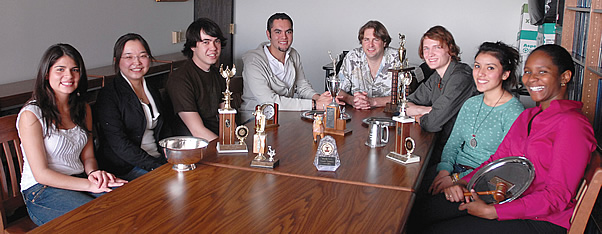Reel to Real
National tournament offers real-life look at "The Great Debators"
February 4, 2008
by Valerie Orleans
In 1935, students from an historically black college in Texas broke through the color line to win national recognition by beating the top-ranked debaters from the nation’s prestigious universities.
The story of Wiley College Professor Melvin B. Tolson and his all-black team inspired the new film, “The Great Debaters,” produced by Oprah Winfrey and directed by Denzel Washington.
While today’s “great debaters” don’t face the same level of discrimination, they do face formidable obstacles, said the coach of Cal State Fullerton’s award-winning debate team, Jon Bruschke.
According to Bruschke, many debate teams still are “white boys’ clubs.”
“That certainly isn’t the case with our group,” he said. “On our team, the number of females is equal to the number of males. Our ethnic breakdown is four Latinos, one African-American, one Japanese/ Caucasian and two Caucasians.”
Bruschke, professor of human communication studies, has coached teams that have been victorious against the likes of Harvard, Berkeley, Northwestern and USC.
“Because our debate team accepts anyone who is willing to put in the work,” he said, “we have students with many different majors and backgrounds. The only thing we care about is our debaters’ passion and commitment.”
That’s just what the debate team members display when they compete.
“We are passionate about our topics because some of us have real experience with those issues,” said Eleecia Barksdale, a senior communications major. “A lot of debate teams are researching areas where they haven’t necessarily experienced some of the situations we have. That’s what I love about our team — we’re really grounded in reality.”
Beyond winning scores of trophies each semester, she said, “debate has helped us think on our feet, react with logic and argue effectively. But at the same time, it’s made us appreciate other points of view as well. We’ve all learned a great deal from Dr. Bruschke and our fellow debaters. What is meaningful for me is, after I’ve debated a topic, I may actually have changed somebody’s point of view.”
Unlike many of the Ivy League universities they compete against, Cal State Fullerton’s team doesn’t have a large budget. While their competition flies to tournaments, the Fullerton debate team often squeezes into Bruschke’s van for the road trip.
There are other differences as well.
“The Cal State Fullerton team does two things that are not always priorities in competition that emphasize technical skills and details,” Bruschke said. “We always try to say something socially significant, and we always try to connect the issues we are debating to the lives of actual people. It’s a strategy that has put us in the top 16 in the nation for five years in a row. More than just being a successful debate team, we are a group of people striving to improve ourselves morally and intellectually. If we never won another round, I would be proud to be associated with this group.”
Debate teams from Harvard, Dartmouth, UC Berkeley and some 60 other colleges and universities traveled to Cal State Fullerton recently for “The Kathryn Congalton Classic” tournament hosted on campus.
Bruschke is hopeful that the release of “The Great Debaters” and exposure to events like the “The Kathryn Congalton Classic” may increase interest in debate among students who may never have thought of themselves as debaters.
“One of our largest supporters, Terry Giles, a successful attorney and businessman, credits his years on the debate team as a critical element in his success,” Bruschke said. “Debate is one of the most intellectually rewarding activities you can imagine. It teaches incredible research and speaking skills, and the ability to utilize logic and passion on behalf of your arguments. And the actual debates themselves require students to process information almost as quickly as they hear it. You have to listen, identify the counter argument, and then make the point — all against the clock. Every tournament requires at least 20 to 30 hours of preparation. Debate is not for the faint-hearted.”
When team members arrive for a debate, they are told whether they will be arguing the affirmative or negative position and are assigned the task of making up a nine-minute speech. Rules require that debaters be prepared to argue in favor of a position in one round, and against it the next.
Many of the debaters on CSUF’s team were first introduced to the concept of debate through SCUDL — the Southern California Urban Debate League, in which debaters at Cal State Fullerton worked with economically underserved high school students who may have had no opportunity to get involved with a debate team.
With limited funding to pay for tournament fees, transportation and school support, the outreach program has been curtailed. However, CSUF debaters continue to work with students to help them develop the skills they will need as college-level debaters.
“We are training the next generation of great debaters,” Bruschke said.

